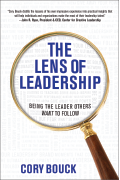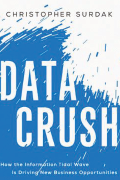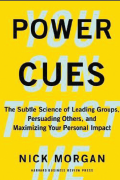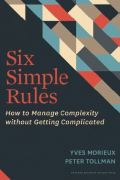TD Magazine Article
Examining Your Leadership Ability
A review of The Lens of Leadership: Being the Leader Others Want to Follow by Cory Bouck
Sun Jun 08 2014

The Lens of Leadership: Being the Leader Others Want to Follow
By Cory Bouck
BookBaby, 320 pp., $24.95
There are many books on leadership. Throw a rock in any direction and you'll hit a stack of them, and all of them are pretty much the same. Every once in a while, however, one book stands out. The Lens of Leadership is one of those. It is a practical, detailed guide to developing yourself and others as leaders.
Bouck, who developed his leadership skills in the U.S. Navy and then honed them at major companies such as General Mills, Rubbermaid, and Johnsonville Sausage, takes a commonsense approach to leadership: One must be a great follower before he can be a great leader. And as Bouck explains in the book's introduction, leadership is about accountability. Great leaders are not afraid to have their results examined through the lens of accountability.
The book is organized into three main sections: "Serve," "Build," and "Inspire." The first section discusses leading by serving, the second covers personal and employee development, and the last section shows readers how to motivate and inspire others.
Each section's chapters build on each other, with a focus on the importance of loyalty, integrity, and professionalism. And all the chapters are filled with anecdotes, quotes, and life lessons from other leaders throughout history. Bouck relies heavily on his lifelong network of colleagues, bosses, and friends for these stories, proving that "nurturing your network" is critical in one's career and life.
At the end of each chapter is a list of additional resources that relate directly to the material in that chapter. Bouck not only draws leadership and life lessons from such popular thought leaders as Stephen Covey, Dale Carnegie, and Ken Blanchard, but also from popular fiction books and films.
The end of each chapter also offers a summary and activity—"What?" "So What?" and "Now What?" The "What?" summarizes the chapter, the "So What?" explains how to apply the concepts in the chapter, and the "Now What?" is a personal development plan, where there is space for readers to journal what they are learning as they apply the information from the book, and as they interact with mentors, co-workers, and friends.
Whether you are a leadership novice, an experienced manager, or talent development professional, The Lens of Leadership should be in your career toolbox.
Data Crush: How the Information Tidal Wave Is Driving New Business Opportunities

Christopher Surdak
AMACOM, 280 pp., $27.95
Any help we can get navigating the vast and confusing world of big data is welcome. In Data Crush, information management expert Surdak presents compelling research and the real-world experiences of early big data adopters. He helps readers understand the implications of this phenomenon and learn from concrete use cases. Surdak explores technological and social trends influencing the growth of data, as well as strategies for responding to and profiting from these new resources. For readers looking for answers to questions such as "What's driving big data?" "How will big data affect my business?" and "How should we respond?" Data Crush puts this knowledge in easy reach.
Power Cues: The Subtle Science of Leading Groups, Persuading Others, and Maximizing Your Personal Impact

Nick Morgan
Harvard Business Review Press, 224 pp., $25
Leaders can say all the right things, but if their body language is sending a contradicting message, their carefully crafted words won't matter. It takes a high level of self-awareness to master one's body language. In Power Cues, Morgan explains the nonverbal cues—such as subtle gestures, facial expressions, sounds, and other signals—that betray thoughts and emotions, and how these can affect one's ability to lead successfully. The author, a communication expert, shows readers how to align their unconscious "power cues" with their conscious messages, which enables them to connect more powerfully, establish better trust, and communicate more effectively—without changing a word they say.
Six Simple Rules: How to Manage Complexity Without Getting Complicated

Yves Morieux and Peter Tollman
Harvard Business Review Press, 206 pp., $30
The time is ripe for a book about simplicity in the workplace. The pursuit of high performance often leads to over-engineered processes and unnecessary initiatives. Morieux and Tollman offer six rules for reintroducing simplicity to the workplace in a way that boosts performance and business results. Readers will learn why a complicated business is bound to fail, two things managers often do to reduce complexity (and why both backfire), why reducing resources is a powerful way to enhance cooperation and performance, how to identify performance factors that really matter, and how to cultivate behaviors that make organizations less complicated.
What's on Lois Zachary's Bookshelf?
The Art of Possibility by Rosamund Stone Zander and Benjamin Zander. This book is music to my ears. It focuses on the power of possibility. It's uplifting, inspiring, and at the same time down to earth and very practical.
Live Good by Kobi Yamada. No matter how often I read and reread this collection of pithy quotes by famous people, it always stimulates deep reflective moments that help me stay grounded and focused on what really matters.
The Art of Doing Nothing: Simple Ways to Make Time for Yourself by Veronique Vienne and Erica Lennard. I always mean to take time for myself, but it is easier said than done. This little gem celebrates the art of unwinding with visual and inviting encouragement to stop the clock and replenish my energy.
